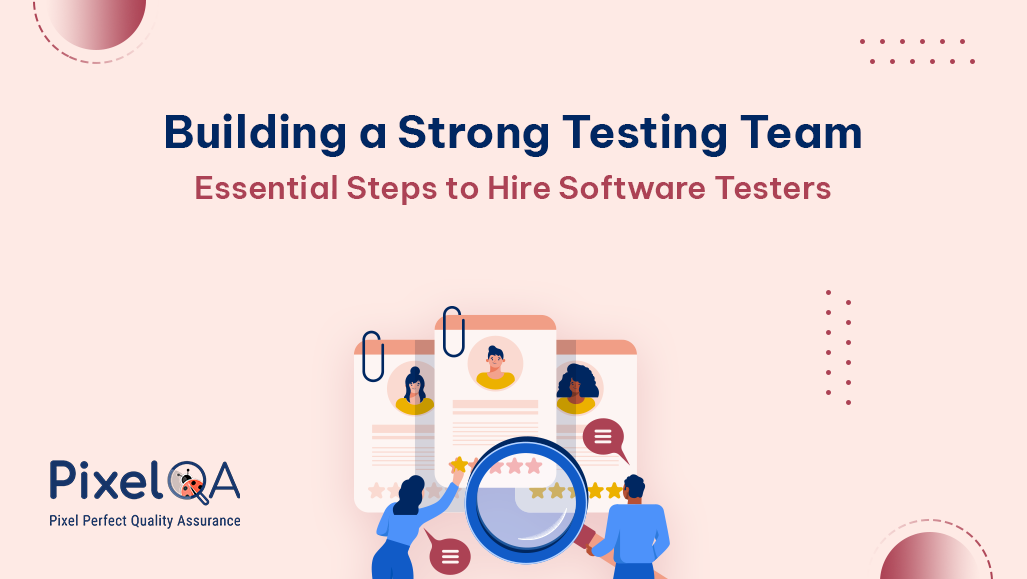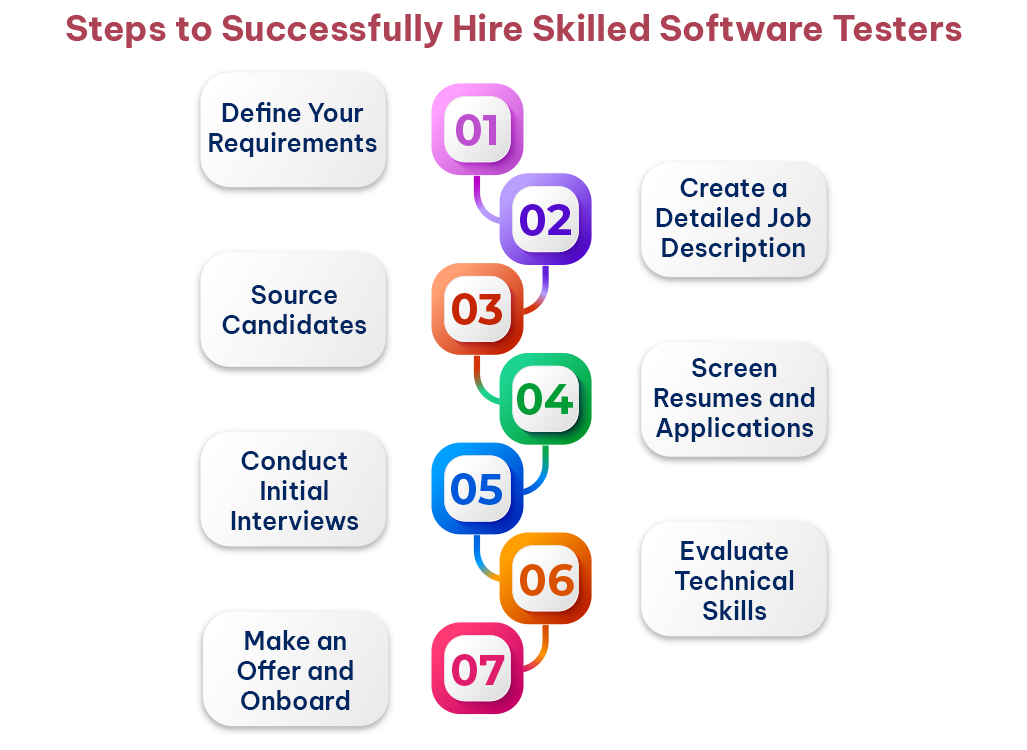
Introduction
The caliber of your software can make or break your company in the domain of software development. The importance of having a dedicated testing team grows as businesses aim to produce a reliable, error-free system. Automation testing services play a crucial role in improving the efficiency of this process. It improves customer happiness and brand reputation in addition to ensuring the functioning and dependability of your product.
But assembling a strong team is no easy task. It calls for more than just technical expertise; it also calls for a calculated approach to selecting the best candidates, promoting teamwork, and staying up to date with market developments.
This article is especially useful for a new startup interested in putting together its first-ever team or for an established business looking to enhance its current one. Now, with no time wasted, let’s get started!
Table of Contents
- Why Do You Need Software Testers?
- How to Find Software Testers?
- Steps to Successfully Hire Skilled Software Testers
- How Can We Help You?
- Conclusion
- People Also Ask
Why Do You Need Software Testers?
It is a universally accepted truth that if a product is to be purchased by the customer, it must be blemishless. This enhances customer satisfaction and the brand reputation. Therefore, software testing personnel come in here, who note every little detail in the application to identify defects, performance issues, and security loopholes before they come to the attention of the end user. Their competence characterizes a system for meeting high-quality standards and operating properly in diverse environments, thereby ensuring a hassle-free user experience. Testing experts keep the company's reputation intact by identifying problems early in the development process, so there is a chance that a very costly fix will not be needed post-release.
They also give a unique perspective in the development process as advocates for the end user by anticipating usability problems and functional gaps. A software testing team works closely with product managers, developers, and designers to ensure that the final product meets user expectations and business goals. Testers do not only control product quality but also streamline the development workflow by employing automated testing approaches. This accelerates the release cycle and promotes continuous integration and delivery. Therefore, a fully experienced testing crew is essential for the success of a reliable, high-quality, and fast-paced project responding to constantly changing needs of the tech-savvy customers.
How to Find Software Testers?
1. Leverage Job Boards and Professional Networks
- Post job openings on popular job boards like Indeed, Glassdoor, Feverr, and Stack Overflow Jobs.
- Utilize LinkedIn to search for software testers and connect with potential candidates.
2. Engage with Testing Communities
- Become part of and actively participate in online testing communities and forums like Ministry of Testing, Test Automation University, or Reddit's software testing subreddit.
- Make contact with experienced testers and ask for referrals and recommendations.
3. Attend Industry Conferences and Meetups
- Engage in industry conferences, seminars, and local meetups that specialize in software testing and quality assurance.
- Meeting people in the industry are International Software Testing Conference (STC) or Agile Testing Days Conference.
4. Connect with Recruitment Agencies
- Partner with recruitment agencies specializing in IT and software testing roles.
- Benefit from their extensive networks and expertise in sourcing and vetting candidates.
5. Explore University Programs and Bootcamps
- Reach out to universities and coding boot camps that offer programs to build software testing teams.
- Connect with recent graduates through career services and job placement programs.
6. Offer Internship Programs
- Create internship programs to attract aspiring testers.
- Evaluate interns’ potential and fit for your team and consider offering full-time positions to successful interns.
7. Referrals from Current Employees
- Encourage your current employees to refer candidates for open testing positions.
- Implement an employee referral program with incentives for successful referrals.
Steps to Successfully Hire Skilled Software Testers

Step 1: Define Your Requirements
First things first, define testing requisites precisely. Specify which types of tests manual, automated, performance, stress, etc., are required, along with skills and knowledge to be sought for the position. Knowing your needs helps in writing a job description for the right candidates.
Step 2: Create a Detailed Job Description
A detailed job description with duties, requisites, and requirements of the position is expected from a software tester. Also, include information of the company, technology, and tools you use, and any previous exposure in this field. The candidate is likely to find the job most appealing when it is written well in terms of readers' minds.
Step 3: Source Candidates
Use various channels to find suitable applicants. Advertise the position on well-known job boards like LinkedIn, Indeed, and Glassdoor. Participate in testing communities and professional networks and think about contacting employment firms that focus on software and IT testing positions. Reaching out to a wide range of applicants will be made easier with this multi-channel strategy.
Step 4: Screen Resumes and Applications
She carefully scrutinizes the applications and resumes in search of applicants with the required experience and qualifications. ISTQB, Knowledge of testing tools, and a proven track record of successful completion of such projects are all qualifications to consider while scrutinizing candidates. Look for factors that indicate a keen attention to detail and problem-solving ability.
Step 5: Conduct Initial Interviews
Technical evaluation, communication competencies, and cultural fit during the first phase of interviewing candidates. Ask how they approach tracking and reporting bugs, how knowledgeable they are concerning different testing methodologies, and how they keep up with trends in the industry. This is going to help you with the shortlisting of candidates for further evaluations.
Step 6: Evaluate Technical Skills
Conduct technical tests to evaluate candidates' proficiency with practical testing. This can involve problem-solving activities, real-world situations, or coding tests for automated testing roles. To see how applicants think and approach a task, you may also invite them to conduct a live session on a sample application.
Step 7: Make an Offer and Onboard
Once you have identified the right candidate, ensure that a fair offer is extended regarding compensation, benefits, and any other perks that the company might offer. It should be clear to everyone in the organization what is expected of them and the possible growth trajectories open to them. After hiring, clearly lay out the objectives and goals, give the new tester training, and integrate them into the team, thereby providing a smooth onboarding experience.
How Can PixelQA Help You?
Having operated as a Software Testing Company for over 12 years, we have gathered considerable experience in quality assurance and building robust testing teams to meet your exact needs. Thus, we guarantee the on-time delivery of the highest quality and reliable software products in conjunction with your development process, and increase customer satisfaction. Our dedicated and experienced software testers can provide various services to fulfil your requirements.
In addition, we offer a full range of testing services to meet your special needs. We offer manual, automated, performance, load, security, and usability testing, to name a few. Using the latest tools and methodologies, we ensure that your software is put to the test for maximum functionality, performance, and security.
Conclusion
Investing smartly in a dedicated test team can set the standards and quality levels of your software very high. You can make your development process reliable and efficient by following the necessary procedures of hiring knowledgeable software testers. High-level teamwork is achieved through an extensive job description, specification of needs, search for applicants, and organizing interview processes.
As you move forward, bear in mind that a good tester is a fine mix of technical skills with a hawk's eye on detail and a commitment to quality. Experts grow in a culture of cooperation and mutual encouragement that they will benefit from throughout their work life. Such a highly dedicated and highly competent team would prepare the organization very well for the changing industry challenges and user needs.
If you reach here where we can understand that you want to recruit some software testers for your project. If so, call us and make sure the quality of your software products!
People Also Ask
1. Why is it important to have a dedicated testing team?
This guarantees that before the software is released, it has been extensively tested for errors, performance problems, and security flaws. Higher-quality products, happier customers, and lower post-release repair costs are the outcomes of this.
2. What skills should I look for in a software tester?
The main competencies include a solid grasp of testing procedures, competence with both automated and manual testing tools, the ability to solve problems, attention to detail, and excellent communication skills. Additional certifications, such as the ISTQB certification, can demonstrate a strong grasp of testing principles.
3. How can I effectively source candidates for software testing roles?
You can exploit the job boards, social media like LinkedIn, online testing communities, industry conferences, recruitment agencies, and educational institutions. Also, Employee referrals could...one of the efficient mechanisms to find a good candidate.
4. What types of testing should a robust testing team be proficient in?
Good coverage and high-quality software are ensured from the outset by becoming proficient in various test types, including manual, test automation, performance, security, usability, and regression testing.
5. What level of involvement do we have during the testing process?
We keep an open discussion and unlimited arguments throughout the testing. We will also update you about the changes, results, and some problems that might arise while we gladly welcome your input and feedback.
6. How do you handle bug tracking and reporting?
Remarkable mechanisms for tracking bugs are incorporated into the process, which will document any bugs identified, prioritize them, and resolve them within a particular time frame. You'll always receive thorough reports and updates to stay clued in along the way.


